Kashmir polls: Fear and mistrust stalk elections in the valley
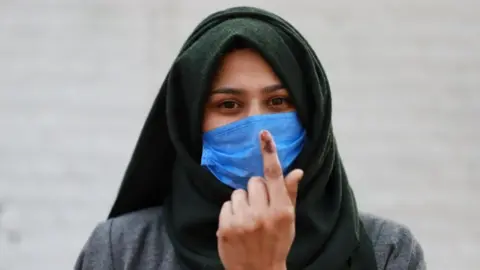 Getty Images
Getty ImagesVoting is underway in Indian-administered Kashmir in the region's first elections since Delhi revoked its special status last year. But the polls are unusual even by Kashmir's stormy standards. BBC's Aamir Peerzada reports from Srinagar.
"There is no democracy in Kashmir," declares 32-year-old Rabia Khursheed.
Ironically, Ms Khursheed is contesting the first ever direct elections for village councils in 20 districts of Jammu and Kashmir. The region's councils, earlier staffed by lawmakers, will be directly elected for the first time. And their members will be charged with local planning and governance, from roads to schools to hospitals.
These councils, at the base of India's democratic pyramid, make up the world's largest exercise in direct elections.
But Ms Khursheed is unimpressed.
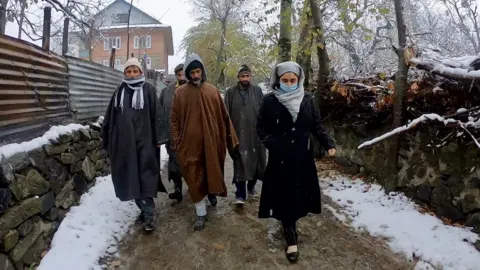
"We don't have any option other than contesting [the polls]. Otherwise what will happen to our future generations?" she asks.
This mix of defiance, frustration and resignation is all too familiar in the Muslim-majority valley. It has long had a tense relationship with India - successive governments have failed to fight militancy in the region without giving the Indian army powers that have led to decades-worth of allegations of human rights abuses.
The rift only widened in August 2019 when the Bharatiya Janata Party-led federal government unilaterally abrogated Article 370, a constitutional provision that guaranteed Kashmir some autonomy. The move - accompanied by a severe communications and internet blockade, and the detention of MPs, activists, journalists and community leaders - was met with protests and global criticism. It was also seen as part of the BJP's right-wing agenda - the party's divisive rhetoric and politics have long been accused of targeting the country's Muslims.
With these elections, the first since the controversial move last year, the BJP hopes to gain a foothold in the valley.
"For Delhi, these elections are very significant. For Jammu and Kashmir, not very significant because the election has been instituted under an appointed ruler, not an elected one," says historian Siddiq Wahid.
He adds that it's an attempt by the BJP to seek "legitimacy".
The party is up against a united opposition and disgruntled population that is sceptical of the elections as a whole.
An unusual election
For the first time, some seven opposition parties have allied to contest the polls together. And their goal is to fight to restore Kashmir's special status.
"The election just a distraction from the real issues that has caused a sense of betrayal and alienation amongst people here," says former chief minister Mehbooba Mufti of Peoples Democratic Party (PDP). She was freed by Indian authorities in October, more than a year after her detention.
Then there are independent candidates like Ms Khursheed. She says she doesn't wish to associate herself with any political party, but she also says she has campaigned to hard to stem the BJP's rise.
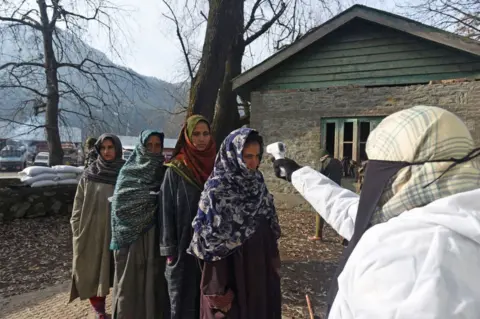 Getty Images
Getty ImagesMs Khursheed is among more than 2,000 candidates in the fray for 280 seats in Jammu and Kashmir. The elections are taking place over eight phases, six of which have already concluded. Her seat in north Kashmir's Baramulla district went to the polls on 7 December.
Some 5.76 million people are registered to vote but Kashmiris have shown little enthusiasm compared to previous elections.
"The BJP has made a big deal about these elections by sending central ministers to campaign in Jammu. These are just village-level elections. And for common people there is little enthusiasm," says Anil Gupta, a journalist based in Jammu.
The Hindu-majority Jammu region has seen higher voter turnout, often crossing 60%. In the valley, it has remained below 41%. The lowest single phase turnout so far - 1.9% - has been recorded in south Kashmir's Shopian district, where militancy has always been rife.
Campaigning in south Kashmir, which is especially volatile, has been challenging and unusual.
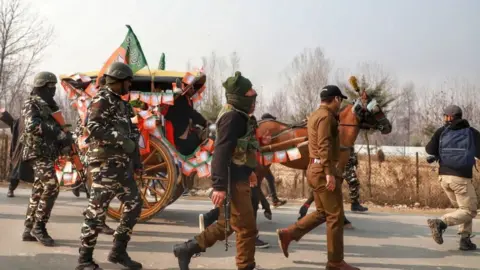 Getty Images
Getty ImagesMass campaigns have been difficult not just because of the pandemic but because of a spike in militancy and political violence. At least nine BJP workers were killed by suspected militants this year, prompting officials to guard candidates round the clock. They have been moved to hotels or government guest houses, where they have been living under tight security.
"It's not possible to provide security individually to every candidate that's why they have been shifted to such accommodations," an official told the BBC.
"I have to give advance notice to police about my visit and when they think it's feasible security-wise then I get the clearance and police escort. I can't blame the police, they are doing this for our safety," says Nazir Ahamad Dar, 46, a BJP candidate in Pulwama, another south Kashmir district that has consistently seen low voter turnout..
He says he has only visited his constituency four times until now and and each time, he only had two hours to campaign.
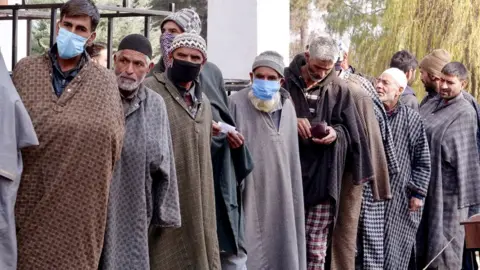
Campaigning happens door-to-door and involves a police escort. And candidates complain that they aren't given enough time on the ground, but officials say they are doing everything they can given the security concerns.
But the opposition allege a more sinister agenda.
Former chief minister, Omar Abdullah, tweeted that the local administration was "going out of its way to help the BJP" and was "locking up candidates opposed to the BJP, using security as an excuse".
"If the security situation isn't conducive to campaigning what was the need to announce elections?" Mr Abdullah said.
But authorities denied the allegations, saying no candidate has been stopped from campaigning everyone was given adequate security.
Fear and mistrust
There is heavy security around polling booths, and voters are being frisked before they cast their ballots.
"We have to be alert," says an officer outside a polling booth in Shopian's Keller constituency.
A group of young men loitering outside the booth say they were not there to vote, but to "keep an eye on people who are coming to cast their votes".
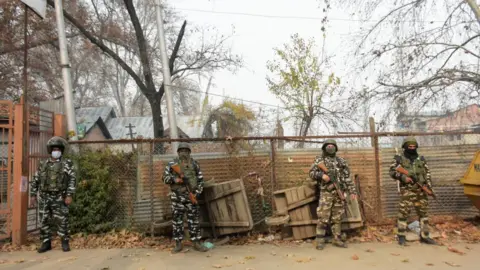 Getty Images
Getty ImagesOne of them says that only the elderly are voting because "they still believe in the old party cardre, but we don't, so you won't see many youngsters voting".
"We know all the elections and parties are same, nothing will change with this," says another of them. They all wished to remain anonymous.
Those who did vote said they were hoping for development.
"We want development in our area and now we have a local representative contesting and that's why I voted, I think it will be easier for us to reach out to him now," said 20-year-old Mohammad Altaf from Shopian.
A group of women in south Kashmir said they were voting for roads because it takes a two-hour walk just to meet the candidates. "We don't have electricity, our kids are not able to read and write in the evenings. Our lives have been ruined but we don't want our children to go through this. I will vote for that," said Fareeda Akhtar.
And then there were those who voted so they have someone to call when security forces come knocking on their doors.
"If the police or the army picks up anyone here, there is nobody we can go to ask for help. I think I can at least go to the person I voted for to ask for help. That's why I voted today," said a 48-year-old voter who didn't want to be named.


